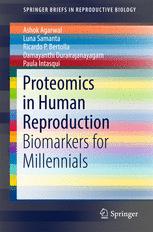

Most ebook files are in PDF format, so you can easily read them using various software such as Foxit Reader or directly on the Google Chrome browser.
Some ebook files are released by publishers in other formats such as .awz, .mobi, .epub, .fb2, etc. You may need to install specific software to read these formats on mobile/PC, such as Calibre.
Please read the tutorial at this link: https://ebookbell.com/faq
We offer FREE conversion to the popular formats you request; however, this may take some time. Therefore, right after payment, please email us, and we will try to provide the service as quickly as possible.
For some exceptional file formats or broken links (if any), please refrain from opening any disputes. Instead, email us first, and we will try to assist within a maximum of 6 hours.
EbookBell Team

4.4
22 reviewsThis Brief explores the use of proteomics as a tool for biomarker discovery in human reproduction and summarizes current findings and trends of proteomic studies in both male and female infertility. This simplifies this important but complex topic and equips the novice reader with sufficient background information on the use of proteomics in human reproduction. The up-to-date scenario on proteomic investigations will also appeal to researchers and post graduate students looking to keep abreast with the latest developments in reproductive research. This review summarizes current findings of contemporary proteomic studies on infertility in both males and females with various reproductive pathologies, and its use in predicting the outcome of assisted reproduction. In human reproduction, the search for biomarkers via proteomics is a fast-evolving approach that involves the analysis of proteins in the reproductive tissues and fluids, such as the male gametes, seminal plasma, ovarian and endometrial tissue, and follicular and uterine fluid. By comparing the protein profile of a healthy, fertile individual against that of an infertile individual, the differentially expressed proteins may give an indication to certain proteins that could serve as useful biomarkers that are related to infertility. As proteomic studies continue to unravel the dynamic proteome behind various infertility conditions, there is potential for the discovery of prognostic markers that could ultimately help in both natural and assisted human reproduction.